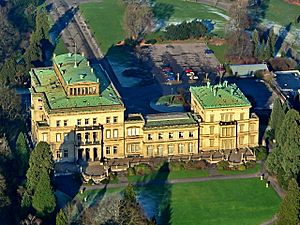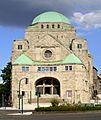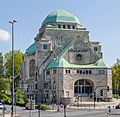Essen facts for kids
Quick facts for kids
Essen
|
|||
|---|---|---|---|

Villa Hügel near the river Ruhr
|
|||
|
|||
| Country | Germany | ||
| State | North Rhine-Westphalia | ||
| Admin. region | Düsseldorf | ||
| District | Urban district | ||
| Subdivisions | 9 districts, 50 boroughs | ||
| Elevation | 116 m (381 ft) | ||
| Population
(2022-12-31)
|
|||
| • City | 584,580 | ||
| • Metro | 5.302.179 | ||
| Time zone | CET/CEST (UTC+1/+2) | ||
| Postal codes |
45001-45359
|
||
| Dialling codes | 0201, 02054 (Kettwig) | ||
| Vehicle registration | E | ||
| Website | www.essen.de | ||
Essen is a big city in Germany, located in the state of North Rhine-Westphalia. It sits by the Ruhr River and is close to other major cities like Cologne, Duisburg, and Bochum. About 585,000 people call Essen home. It is one of the largest cities in the Ruhr Area, a region with over 5 million residents. Essen is often called the "shopping city" because it has many malls and stores.
Contents
Where is Essen Located?
Essen is found in the western part of Germany, within the state of North Rhine-Westphalia. It is a key part of the Ruhr Area, which includes eleven cities and four districts. The Ruhr and Emscher rivers flow through Essen. A beautiful lake called Baldeney is also part of the Ruhr River here.
Essen shares its borders with several other cities. To the west, you'll find Oberhausen and Mülheim an der Ruhr. To the south are Ratingen, Heiligenhaus, and Velbert. East of Essen are Hattingen, Bochum, and Gelsenkirchen. Finally, to the north are Gladbeck and Bottrop. Other important cities nearby include Duisburg, Düsseldorf, Cologne, Dortmund, and Münster.
How is Essen Governed?
Essen has a long history of being a city where many coal miners lived and worked. Because of this, the SPD (a political party focused on social fairness) has always been very popular here.
During the time of National Socialism, the Nazi Party chose the city's mayors. However, from 1999 to 2009, the Christian Democratic Party led the city with Mayor Dr.Wolfgang Reiniger. In the local elections of 2009, Reinhard Paß from the SPD became the new mayor.
What are the Famous Places in Essen?
Essen is home to many interesting and famous places. Here are some you might want to visit:
- Villa Hügel: This was the grand home of the Krupp family, who were very important industrialists.
- Essen Cathedral: This is the main church for the Roman Catholic Diocese of Essen. Inside, in the Domschatzkammer (dome treasure chamber), you can see the famous Golden Madonna of Essen.
- Old Synagogue (Alte Synagoge): An important historical building.
- Lichtburg: This is the oldest cinema in Germany and still shows movies today.
- Zeche Zollverein: Once a large coal mine, it has been a UNESCO World Heritage Site since 2001. It's now a museum and cultural center.
- Folkwang museum: A large museum that also has a famous music academy.
- Werden abbey: A historic monastery founded around the year 800.
- Aalto theatre: Essen's largest theater, designed by the famous Finnish architect Alvar Aalto.
- Essen philharmonic orchestra: This building, also known as Saalbau, is right next to the Aalto theatre.
What is Essen's History?
Essen's story began around 850 when Saint Altfrid founded the Damenstift, a special abbey for women led by a princess. Around this time, the Essen Cathedral was built. The city was first known by its Latin name, Assindia. Over time, its name changed through Essendia and Essend to what it is today: Essen.
In 1377, Essen became a free imperial city, meaning it was directly under the rule of the Holy Roman Emperor. Back then, it was a small town in a quiet area. Essen grew much more important when the Industrial Revolution started. In 1811, Friedrich Krupp opened a small steel factory in Essen. This factory grew very quickly, and so did the city's population. Just 80 years after Krupp's factory began, Essen was a big city with 100,000 residents.
The Ruhr River region had lots of coal, which led to many coal mines opening in Essen and nearby cities. Wealthy industrial families, like the Krupps, Haniels, and Grillos, helped fund cultural buildings such as the Grillo theatre and the Folkwang museum.
Because of its large industries, Essen was heavily bombed during World War II. Many lives were lost, and many buildings were destroyed. Not all of them were rebuilt after the war. In the 1970s, coal mining in Essen stopped because coal from other countries became cheaper. This made the city poorer. However, Essen was saved by a Strukturwandel (structural change). Old coal mines, like Zeche Zollverein, were turned into museums or theaters. In 2003, the universities of Essen and Duisburg joined together to form the University Duisburg-Essen.
In 2010, Essen was named Kulturhauptstadt Europas (European Capital of Culture). It shared this honor with Istanbul and Pécs in Hungary.
Media and News in Essen
Essen is a hub for media. The WDR (Westdeutscher Rundfunk, which means Western German Broadcasting) has a TV station here. The city is also home to the two largest newspapers, the WAZ (Westdeutsche Allgemeine Zeitung) and the NRZ (Neue Ruhr Zeitung). Both newspapers belong to the WAZ-media group. Essen also has its own radio station called Radio Essen.
Exploring Essen's Boroughs
Essen is divided into nine main districts (Bezirke) and 50 smaller areas called boroughs (Stadtteile). Some of the most well-known boroughs include:
- Kettwig: Until 1975, Kettwig was a separate town. Its Altstadt (old town) is famous for its many beautiful timber-framed houses.
- Werden: Located in the south of the city, Werden is Essen's oldest borough. The historic Werden abbey is found here.
- Rüttenscheid: This borough is known for its many cultural buildings, like the Folkwang museum. The WDR-studio and Essen's trade fair, the Gruga, are also in Rüttenscheid.
- Katernberg: In the north of Essen, Katernberg was where many coal miners used to live. Zeche Zollverein is located here. The Krupp family built many houses in Katernberg for their workers.
- Margarethenhöhe: This was another large coal miner's borough, close to Rüttenscheid. It was named after Margarethe Krupp. The Krupps built houses and shops for their workers, hoping they would spend their wages there. Today, Margarethenhöhe is considered one of Essen's most beautiful boroughs.
- Steele: In the east of the city, Steele was once as big as Essen in the 19th and early 20th centuries.
- Borbeck: Located in the west, Borbeck was separate from Essen for a long time. It is home to the large Borbeck Castle (Schloss Borbeck). People from Borbeck even speak their own regional dialect, called Borbecker Platt.
The nine main districts of Essen are:
- Bezirk I (Stadtmitte/Frillendorf/Huttrop)
- Bezirk II (Rüttenscheid/Bergerhausen/Rellinghausen/Stadtwald)
- Bezirk III (Essen-West)
- Bezirk IV (Borbeck)
- Bezirk V (Altenessen/Karnap/Vogelheim)
- Bezirk VI (Katernberg/Schonnebeck/Stoppenberg)
- Bezirk VII (Steele/Kray)
- Bezirk VIII (Ruhrhalbinsel)
- Bezirk IX (Werden/Kettwig/Bredeney)
Famous People from Essen
Many notable people have connections to Essen:
- Heinz Rühmann: A famous actor whose parents owned Essen's well-known hotel Handelshof.
- Carl Humann: An explorer known for his work on the Great Altar of Pergamon.
- Karl Baedeker: A publisher whose company created many popular travel guidebooks.
- Alfred Krupp: A key figure in the Krupp industrial family.
- Franz Dinndendahl: He built the first steam engine in the Ruhr area.
Other important people who lived and worked in Essen for a long time include:
- Berthold Beitz: He helped save the Krupp company from financial trouble.
- Wilhelm Busch: A famous poet and painter.
- Gustav Heinemann: A German politician who was once mayor of Essen and later became the federal president of Germany.
Sports in Essen
The most popular sport in Germany is soccer. Essen has two important soccer clubs: Rot-Weiß Essen (RWE) and Schwarz-Weiß Essen. The women's soccer club, SG Essen-Schönebeck, is even more successful, playing in the top league, the Bundesliga.
Another big sport in Essen is team handball. TUSEM Essen is the city's most important club in this sport. For ice hockey fans, there's the ESC Moskitos Essen. The biggest basketball club is ETB Wohnbau Baskets Essen. Essen also has many clubs for table tennis and swimming.
Essen's Twin Towns
Essen has special partnerships with several cities around the world. These are called twin towns:
 UK - Sunderland, since 1949
UK - Sunderland, since 1949 Finland - Tampere, since 1960
Finland - Tampere, since 1960 France - Grenoble, since 1974
France - Grenoble, since 1974 Russia - Nizhny Novgorod, since 1991
Russia - Nizhny Novgorod, since 1991 Israel - Tel Aviv-Yafo, since 1991
Israel - Tel Aviv-Yafo, since 1991
Images for kids
-
View over Central Essen from Bottrop
See also
 In Spanish: Essen para niños
In Spanish: Essen para niños
 | James B. Knighten |
 | Azellia White |
 | Willa Brown |




































































